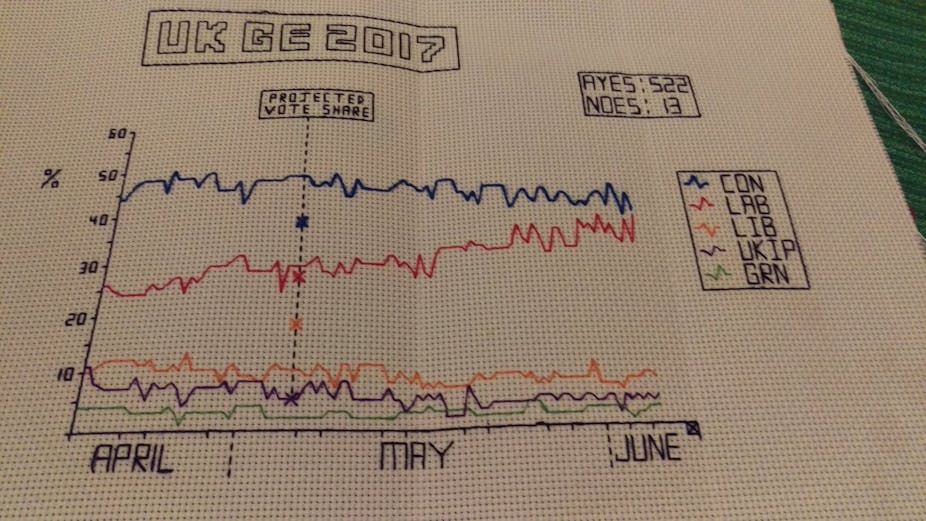When the prime minister, Theresa May, called a general election back in mid-April it was widely assumed she would easily win a large majority. The Conservative leader was far more popular than her Labour rival Jeremy Corbyn, and had a clear path back into No 10. We know this because the voters themselves told us – through opinion polls.
Six weeks later, the narrative is rather different. Labour’s manifesto has been praised while the Tory campaign has stuttered. Though a Conservative majority is still the most likely outcome, Corbyn appears increasingly confident while May seems more worried. But again this is largely down to the polls.
Like it or not, opinion polls are a staple part of an election campaign narrative. The media often obsesses over the slightest swings, enquiring of their readers and of party leaders: why, what have you done to increase or lose support?
But what if the media was not allowed to report on such polls during an election campaign? It might lead to a renewed focus on policy issues instead of “who is winning”. But banning polls may also hand even more power to political parties and media gatekeepers.
The influence of polls
Polls can drive campaigning style and substance. A leader buoyant in the polls will appear more confident and relaxed, so fulfilling the prophecies of the polls by delivering more assured performances. A leader lagging may seem edgy and nervous about answering questions, constantly second guessing how the media will replay their words and how the public will respond. This can lead to the sort of less assured performance that voters can find a turn off.
But an impact on substance matters. A struggling campaign will seek magic bullets to secure victory, which may simply mean candidates repeat slogans they think have traction, or focus on negative messages and image building exercises. As polls narrow, so does the debate, and candidates will completely avoid getting drawn into debates on policy detail that might obscure their message. Without the distraction of headlines based on polling, however, campaigns may feel more able to engage in serious and detailed policy debate.
Polls also influence voters. There has long been talk of polls creating a bandwagon effect, with voters flocking to support the party or candidate who is the most likely winner. This might explain the recent surge in Labour support, or the landslide victory in Scotland for the SNP in 2015. In both cases polls suggested the tide was moving one particular way, which can drive the decision making of undecided voters.

Alternatively poll predictions can mobilise or depress activism and voter turnout. If activists believe their party is doing well they may not feel the need to do as much door-knocking, while if a party is doing poorly they may feel disillusioned (though the reverse can be the case for both scenarios).
Similarly on election day voters can look at the polls and form the belief their vote does not matter or that they will get the outcome they want without making the effort to vote. Hence polls affect the nature and levels of engagement of an election campaign.
Polls provide transparency
But polls will be commissioned regardless of coverage, and many parties rely on pollsters to give an indication of how their campaign is going. If polls go unreported citizens will not be aware of why the focus of a campaign is shifting.
Voters may attribute a less than assured performance to poor poll performance and be sympathetic. Similarly they may see an act as desperate and driven simply by the polls and so grow cynical. Without the polls a vital sense of transparency of process is lost, and voters would only be able to speculate at what is driving campaign strategies.
So a campaign without polls could allow leaders to be themselves, unaware of the public reaction beyond that from the audience immediately in front of them. Leaders may also feel they must get more into the detail, persuading through the use of facts and costed promises that can be interrogated, rather than resorting to headlines or negative attacks in order to draw in the least engaged voters. Parties may also court activists more, in the hope that every leaflet or phone call can make a difference.
While many of these things happen in the course of a campaign anyway, the focus can be skewed by the erroneous notion that polls are shifting for or against a party. Comparing the performances of May and Corbyn one might attribute some of their performance style and communication strategy to perceptions of their relative standing in the polls.
All this relies on party leaders and strategists also being unaware of their standing with the public, however. And with pollsters in the business of making news and attracting corporate clients, it is hard to imagine an election truly without polls.
But what if polls were treated with greater caution and scepticism? If reporters were more clear about margins of error, or the difficulty of factoring in underrepresented groups, then both parties and citizens may not be so ready to be influenced by each percentage point change. In turn elections may be less negative, more substance focused and leaders could perform with fewer worries about the next day’s headlines.
Perhaps reporting of polls simply needs to be better – not banned.

